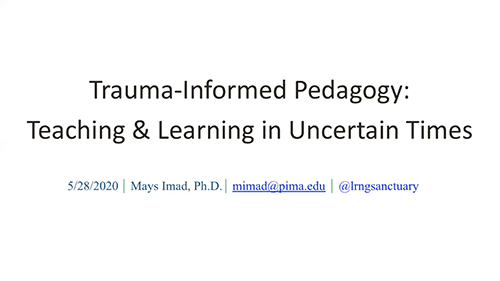Trauma-Informed Teaching and Learning: How Do We Help Our Students Recognize and Mitigate the Impact of Stress and Traumatic Experiences
In times of uncertainty, we look to our leaders–at home, at school, and at work–for guidance and reassurance. Students, particularly underprivileged students, look to their instructors for this kind of reassurance and comfort. How can we ease student anxiety while we ourselves feel anxious, overwhelmed, and unsure about the future? How do we provide a sanctuary that allows students to continue learning and growing?
This webinar is designed for educators interested in the principles of trauma-informed teaching and learning practices. Participants explore strategies they can use to help their students continue learning in the midst of a pandemic.
Learning Outcomes:
By the end of this session, participants will learn:
- The physiological impact of traumatic experiences.
- The impact of trauma on the brain and learning.
- Strategies to mitigate this impact and improve student learning.
Mays Imad is the founding coordinator of the Teaching and Learning Center at Pima Community College, where she also teaches pathophysiology and biomedical ethics. She received her undergraduate training in Philosophy from the University of Michigan and her graduate training in Cellular and Clinical Neurobiology from Wayne State University. Imad’s current research focuses on stress, self-awareness, advocacy, classroom community, and how these topics relate to cognition, metacognition, and student learning.
Please Note:
Only those attending the LIVE webinar will receive a certificate of attendance. Thank you!


